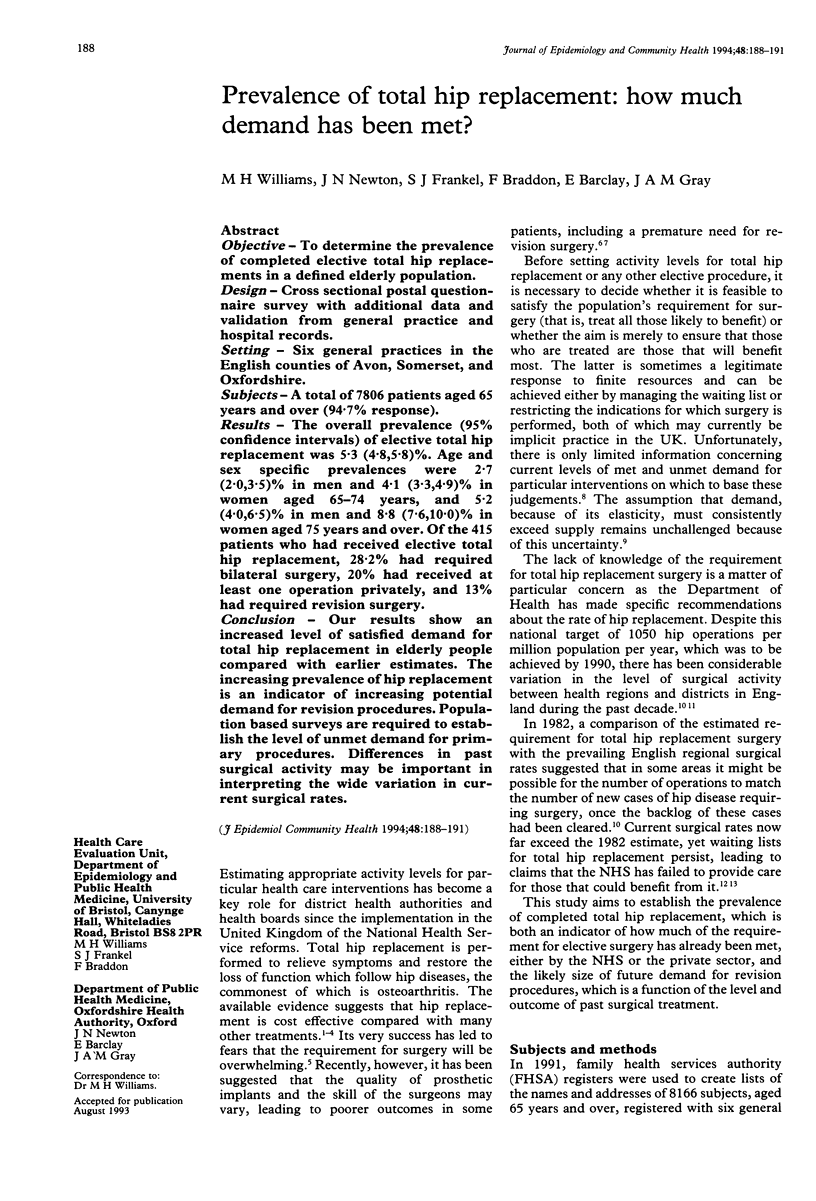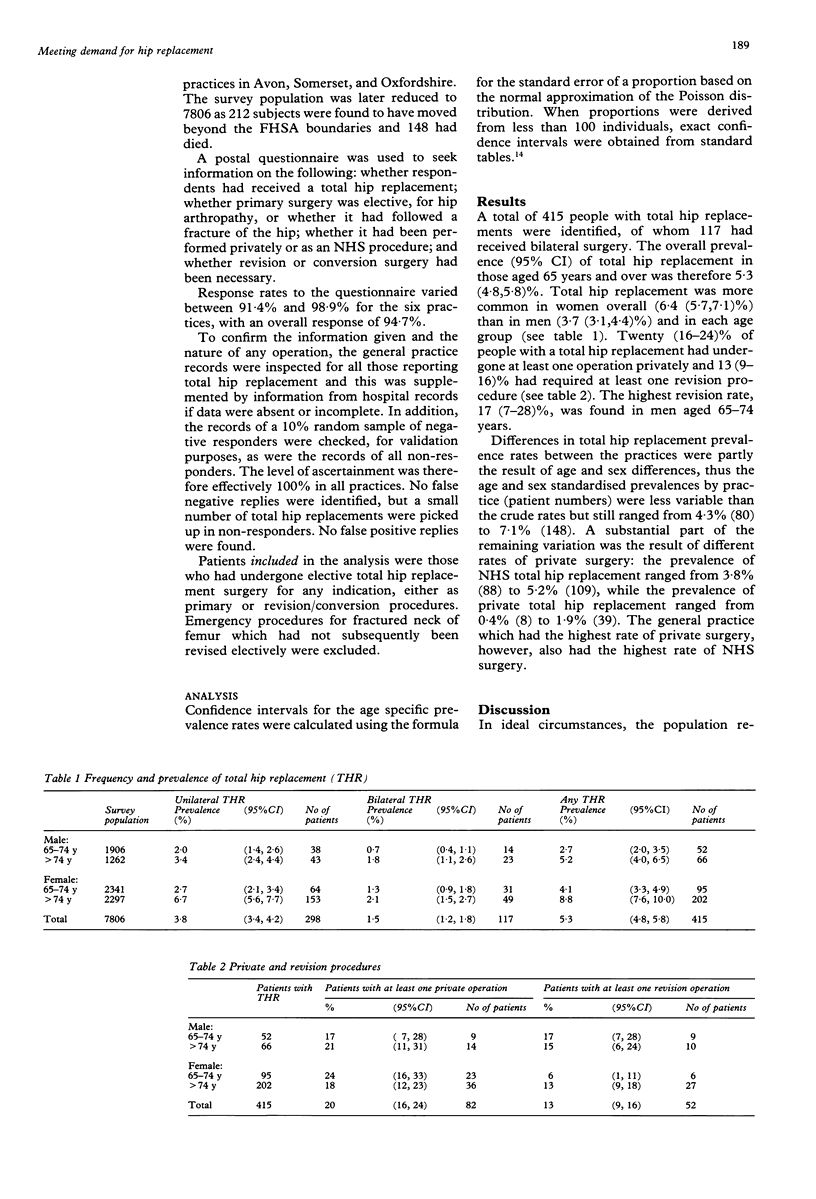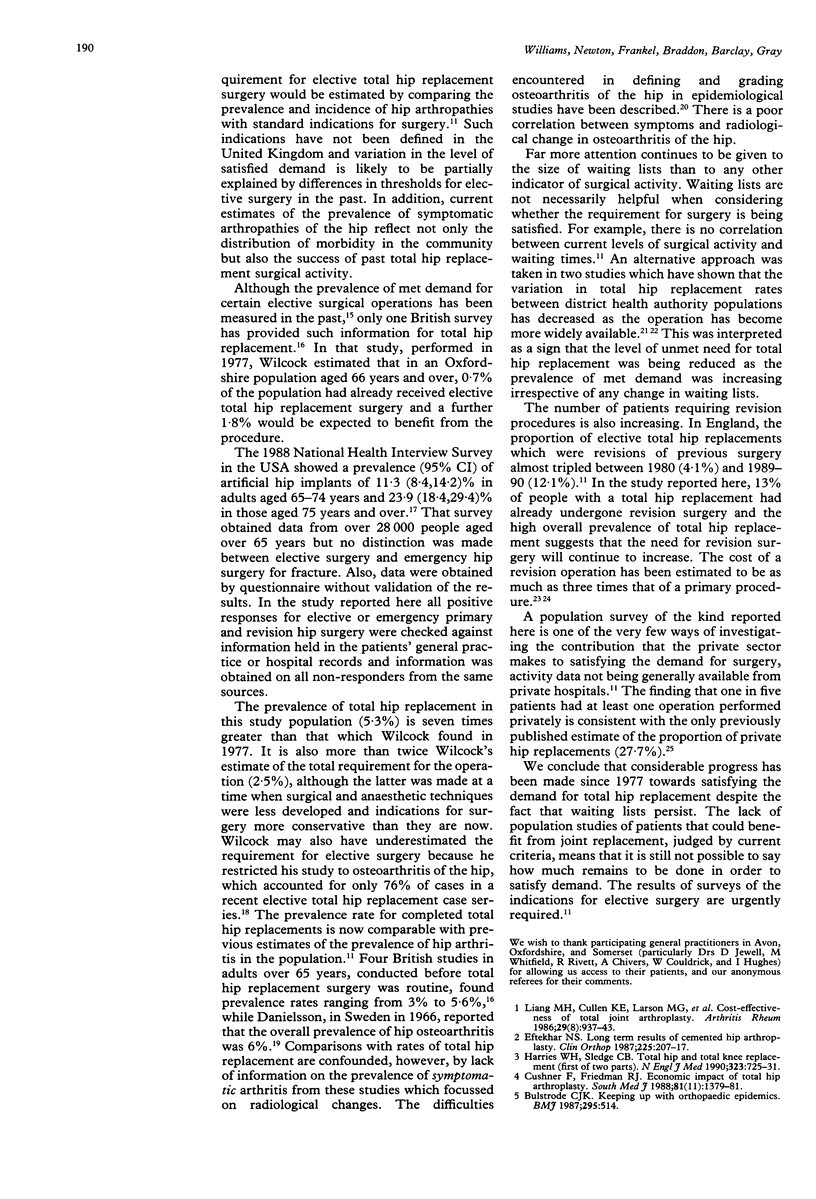Abstract
OBJECTIVE--To determine the prevalence of completed elective total hip replacements in a defined elderly population. DESIGN--Cross sectional postal questionnaire survey with additional data and validation from general practice and hospital records. SETTING--Six general practices in the English counties of Avon, Somerset, and Oxfordshire. SUBJECTS--A total of 7806 patients aged 65 years and over (94.7% response). RESULTS--The overall prevalence (95% confidence intervals) of elective total hip replacement was 5.3 (4.8,5.8)% Age and sex specific prevalences were 2.7 (2.0,3.5)% in men and 4.1 (3.3,4.9)% in women aged 65-74 years, and 5.2 (4.0,6.5)% in men and 8.8 (7.6,10.0)% in women aged 75 years and over. Of the 415 patients who had received elective total hip replacement, 28.2% had required bilateral surgery, 20% had received at least one operation privately, and 13% had required revision surgery. CONCLUSION--Our results show an increased level of satisfied demand for total hip replacement in elderly people compared with earlier estimates. The increasing prevalence of hip replacement is an indicator of increasing potential demand for revision procedures. Population based surveys are required to establish the level of unmet demand for primary procedures. Differences in past surgical activity may be important in interpreting the wide variation in current surgical rates.
Full text
PDF



Selected References
These references are in PubMed. This may not be the complete list of references from this article.
- Bulstrode C. J., Murray D. W., Carr A. J., Pynsent P. B., Carter S. R. Designer hips. BMJ. 1993 Mar 20;306(6880):732–733. doi: 10.1136/bmj.306.6880.732. [DOI] [PMC free article] [PubMed] [Google Scholar]
- Bulstrode C. Keeping up with orthopaedic epidemics. Br Med J (Clin Res Ed) 1987 Aug 29;295(6597):514–514. doi: 10.1136/bmj.295.6597.514. [DOI] [PMC free article] [PubMed] [Google Scholar]
- Coulter A., McPherson K. Socioeconomic variations in the use of common surgical operations. Br Med J (Clin Res Ed) 1985 Jul 20;291(6489):183–187. doi: 10.1136/bmj.291.6489.183. [DOI] [PMC free article] [PubMed] [Google Scholar]
- Cushner F., Friedman R. J. Economic impact of total hip arthroplasty. South Med J. 1988 Nov;81(11):1379–1381. doi: 10.1097/00007611-198811000-00011. [DOI] [PubMed] [Google Scholar]
- Danielsson L. Incidence of osteoarthritis of the hip (coxarthrosis). Clin Orthop Relat Res. 1966 Mar-Apr;45:67–72. [PubMed] [Google Scholar]
- Davidge M., Harley M., Vickerstaff L., Yates J. The anatomy of large inpatient waiting lists. Lancet. 1987 Apr 4;1(8536):794–796. doi: 10.1016/s0140-6736(87)92812-1. [DOI] [PubMed] [Google Scholar]
- Dreghorn C. R., Hamblen D. L. Revision arthroplasty: a high price to pay. BMJ. 1989 Mar 11;298(6674):648–649. doi: 10.1136/bmj.298.6674.648. [DOI] [PMC free article] [PubMed] [Google Scholar]
- Eftekhar N. S. Long-term results of cemented total hip arthroplasty. Clin Orthop Relat Res. 1987 Dec;(225):207–217. [PubMed] [Google Scholar]
- Frankel S. Health needs, health-care requirements, and the myth of infinite demand. Lancet. 1991 Jun 29;337(8757):1588–1590. doi: 10.1016/0140-6736(91)93276-f. [DOI] [PubMed] [Google Scholar]
- Frankel S. The epidemiology of indications. J Epidemiol Community Health. 1991 Dec;45(4):257–259. doi: 10.1136/jech.45.4.257. [DOI] [PMC free article] [PubMed] [Google Scholar]
- Harris W. H., Sledge C. B. Total hip and total knee replacement (1). N Engl J Med. 1990 Sep 13;323(11):725–731. doi: 10.1056/NEJM199009133231106. [DOI] [PubMed] [Google Scholar]
- Madhok R., Lewallen D. G., Wallrichs S. L., Ilstrup D. M., Kurland R. L., Melton L. J., 3rd Trends in the utilization of primary total hip arthroplasty, 1969 through 1990: a population-based study in Olmsted County, Minnesota. Mayo Clin Proc. 1993 Jan;68(1):11–18. doi: 10.1016/s0025-6196(12)60013-5. [DOI] [PubMed] [Google Scholar]
- Nicholl J. P., Beeby N. R., Williams B. T. Role of the private sector in elective surgery in England and Wales, 1986. BMJ. 1989 Jan 28;298(6668):243–247. doi: 10.1136/bmj.298.6668.243. [DOI] [PMC free article] [PubMed] [Google Scholar]
- Rajaratnam G., Black N. A., Dalziel M. Total hip replacements in the National Health Service: is need being met? J Public Health Med. 1990 Feb;12(1):56–59. doi: 10.1093/oxfordjournals.pubmed.a042507. [DOI] [PubMed] [Google Scholar]
- Seagroatt V., Tan H. S., Goldacre M., Bulstrode C., Nugent I., Gill L. Elective total hip replacement: incidence, emergency readmission rate, and postoperative mortality. BMJ. 1991 Dec 7;303(6815):1431–1435. doi: 10.1136/bmj.303.6815.1431. [DOI] [PMC free article] [PubMed] [Google Scholar]
- Sharkness C. M., Hamburger S., Moore R. M., Jr, Kaczmarek R. G. Prevalence of artificial hip implants and use of health services by recipients. Public Health Rep. 1993 Jan-Feb;108(1):70–75. [PMC free article] [PubMed] [Google Scholar]
- Treacy R., Carter S., Grigoris P., Pynsent P. Failed hip replacements. BMJ. 1992 Feb 1;304(6822):317–317. doi: 10.1136/bmj.304.6822.317. [DOI] [PMC free article] [PubMed] [Google Scholar]
- Wilcock G. K. The prevalence of osteoarthrosis of the hip requiring total hip replacement in the elderly. Int J Epidemiol. 1979 Sep;8(3):247–250. doi: 10.1093/ije/8.3.247. [DOI] [PubMed] [Google Scholar]


